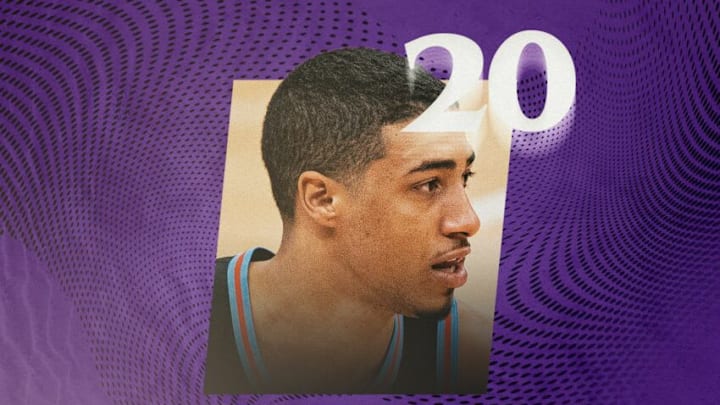If you think a Scottie Pippen comparison is hyperbolic for Tyrese Haliburton, maybe you need to watch more of Tyrese Haliburton.
Scottie Pippen has become the archetypal second-best guy. That’s kind of what happens when you win six championships as the wingman for arguably the greatest player in basketball history. But the legacy that’s been laid over Pippen doesn’t just work because he won and it doesn’t just work because he won with Michael Jordan — the specifics of their on-court relationship really can be generalized.
Scottie was the ideal second-fiddle, first and foremost, because he could have been the first-fiddle for almost any other team in the league. In the two prime seasons he played without Michael Jordan (except for 17 games when Jordan returned at the of the 1994-95 season), Pippen averaged 21.7 points, 8.4 rebounds, 5.4 assists, 2.9 steals and 1.0 blocks per game, on a 55.2 true shooting percentage. In that one full season without Jordan, he helped the Bulls win 55 games, exactly two less than they had won the season before.
Pippen was comfortable playing second to Jordan, although let’s be real, he didn’t have much of a choice, but he also had the skills to make it work. He could downshift his scoring load without sacrificing his impact. He was an elite and versatile defender. A reliable spot-up shooter. A guy who could create his own shot, set up his teammates with ease or attack a broken defense. He could slide fluidly between roles, from possession to possession, depending on what the situation called for.
The Sacramento Kings may not have their Michael Jordan yet (although I’m awful fond of De’Aaron Fox). But in Tyrese Haliburton, I think they have their Scottie Pippen.
Tyrese Haliburton can do whatever the Sacramento Kings need
Tyrese Haliburton has played exactly one NBA season, and an abbreviated and pandemic-warped one at that. All he did was average 13.0 points, 5.3 assists, 3.0 rebounds and 1.3 steals per game, shooting 52.9 percent from inside the arc and 40.9 percent from beyond it.
He ranked in the 71st percentile in scoring efficiency out of the pick-and-roll. He recorded more than three assists for every turnover he made. He established himself as one of the better pull-up shooters in the league, and one of the most efficient finishers on drives. He shot 14-of-24 and 7-of-15 from beyond the arc in clutch situations. He made about as many unassisted 2-pointers as Norman Powell, but in 500 fewer minutes. Across 58 games, he was three missed free throws and 17 missed field goals short of a 50/40/90 season, again — AS A ROOKIE.
In terms of overall impact, his defense left something to be desired but he averaged 1.6 steals per game and finished the season with more steals and blocks combined (105) than turnovers (92) or personal fouls (83). And he did that while be asked to lean, significantly, into his defensive versatility — among the five players he defended most often last season are Darius Garland (6-foot-1), Derrick White (6-foot-4) and Kelly Oubre Jr. (6-foot-7).
It’s a bit easier to make the case for Haliburton using stats because his game is unassuming. His jumper has a unique form and he doesn’t wow with speed or power or slick handles. He doesn’t regularly swing wild, no-look passes or throw down thunderous dunks. He just quietly goes out there and checks every freaking box.
In the 16 seasons since the Kings last made the playoffs, seven different players have led the team in scoring. De’Aaron Fox is the most recent, having averaged 21.1 and 25.2 points per game over seasons in which the Kings have won significantly less than half their games. All that is to say, Fox is a fantastic player and he still might be their Michael Jordan (if not the Michael Jordan), the kind of player who brings the present and future into focus, clarifies the mission at both ends of the floor and by virtue of talent and leadership slots everyone else on the roster into their defined roles.
But even if he’s not, the Kings may have solved the other half of that equation. I’m not sure yet that Haliburton is destined for the Scottie Pippen tier, the second-fiddle who would be the star on nearly any other team. But he’s headed that way — he defends, multiple positions, with aggressiveness, awareness and effectiveness. He scores, efficiently, from all over the floor and in a variety of scenarios, and just as comfortably toggles over to setting up his teammates. He can play on or off the ball and seems willing to do whatever is asked. He is the perfect wingman — in the Top Gun, help you win at beach volleyball, keep Russian fighters off your back and impress Kelly McGillis sense.
This may all seem inconsequential. Does it matter if the Kings have the ideal second-best guy if their No. 1 and Nos. 3-15 aren’t up to the challenge? Does the perfect wingman matter if you’re just flying with ghosts? I don’t know the answers to those questions but I do know nothing works without Goose.
